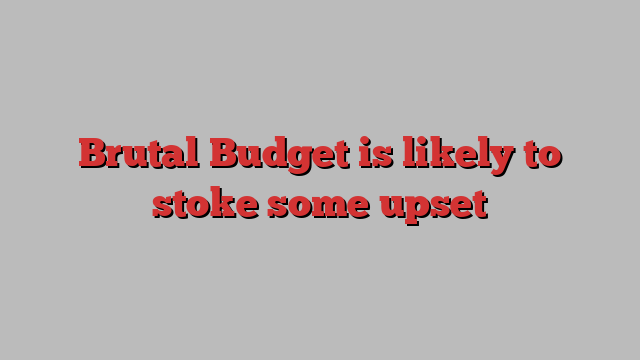
This article is an on-site version of our Inside Politics newsletter. Subscribers can sign up here to get the newsletter delivered every weekday. If you’re not a subscriber, you can still receive the newsletter free for 30 days
Rachel Reeves has delivered the biggest tax-raising Budget in at least half a century, a touch higher than Norman Lamont’s in March 1993, Denis Healey’s in April 1975, and considerably larger than other post-election hikes such as Gordon Brown’s in 2002 or Geoffrey Howe’s in 1981. She has also increased NHS day-to-day spending by £22bn — the biggest real-terms rise since 2010, excluding the pandemic years.
The original sin of this Budget was always going to be Labour’s pledges not to touch income tax or national insurance, which means instead of reaching for those obvious tax rises we have instead a series of revenue-raising measures that all pull against the government’s big task of boosting the UK’s growth rate.
Increasing employers’ national insurance contributions and changing the agricultural sector’s exposure to inheritance tax both raise revenue. But they also come at an economic cost. The latter in particular, I think, comes with some heavy political risks as it is going to be a further challenge for family farms: something that you can easily see becoming a running sore for the new government.
The politics of this Budget are pretty obvious — spending increases for the voters Labour thinks it needs to keep on-side in order to be re-elected, paid for by taxes on the people much lower on the party’s priority list. (It turns out that the answer to “what is a working person?” correlates strongly with “votes Labour in 2024” — who knew?)
Those revenue raisers have been partially tempered by a desire to avoid significant economic damage — increases to capital gains tax and carried interest, which went up essentially to the limit of what the industry warned was tolerable — but this is a set of tax rises that come with health risks attached.
Some more thoughts on the Budget tomorrow, while below, some thoughts on two issues that could yet become political rows from today’s announcement.
Inside Politics is edited by Georgina Quach. Read the previous edition of the newsletter here. Please send gossip, thoughts and feedback to [email protected]
These are very tight spending settlements for most departments
This Budget significantly increases the amount of money going to the NHS, to schools and to building council housing. But overall departmental spending, including capital spending, is going up only 1.7 per cent in real terms. This is an increase on what the previous government had planned, but it is going to shake out as a pretty brutal set of budgets for some departments. Rachel Reeves will hope that this Budget ends up being seen as “the one where the government increased taxes a lot to start fixing the NHS”. But it could equally be “the one that presaged a year of enervating rows about cuts to the Department for Digital, Culture, Media & Sport budget or to farming subsidies”. The precise detail of the departmental settlements will tell us a lot.
The Budget did very little to combat poverty, at home or abroad
We didn’t expect anything on the two-child benefit cap — which restricts child welfare payments to the first two children in most families and is essentially a child poverty guarantee — at this Budget. Divisiveness among Labour MPs over the issue brought about early rebellion. The government’s party management technique here is to say “look, there is a cross-departmental review into child poverty reduction that ends shortly before the comprehensive spending review next year, wink wink”.
Nor, thanks to Lucy Fisher’s scoop, did we expect anything for international development. The government’s party management technique there is to promise that, as the Home Office brings down its backlog of asylum applications, that money will be returned to the foreign aid budget.
But taken together it means that this Budget does very little, outside the increased minimum wage and the rise in carer’s allowance, to combat poverty either here in the UK or overseas. Poverty reduction is one of the biggest animating causes on the Labour benches. Just as George Osborne found himself under increasing pressure from 2010 to 2012 to cut the 50p tax rate, we haven’t heard the last of this.
Top stories today
-
Gilt trip | UK borrowing costs climbed today, reversing an initially positive reaction to the Labour government’s inaugural Budget, as investors were unsettled by news of higher than expected bond sales necessary to fund its spending plans.
-
Sunak lashes out | Chancellor Rachel Reeves was accused by Rishi Sunak of “broken promise after broken promise” and having “fiddled the figures”. The acting Tory leader told MPs the Labour administration had embarked on a “spree of tax rises they promised the working people of this country they would not do”.
-
Time on Starmer’s side | With a working majority of 163 and at least four years until the election, this Budget was unusual for being strategic and focused on the long term. George Parker weighs whether Reeves’ and Starmer’s political gamble will pay off by the time voters go to the polls.
-
Thresh it out | From tax and investments to pensions and property . . . here’s our summary of the key measures in the Budget and how they will affect your personal finances.
-
‘No nuclear risk’ | Firefighters are starting to bring under control a large fire at a BAE Systems shipyard in north-west England where the UK’s biggest defence company builds nuclear submarines.
Recommended newsletters for you
US Election Countdown — Money and politics in the race for the White House. Sign up here
One Must-Read — Remarkable journalism you won’t want to miss. Sign up here